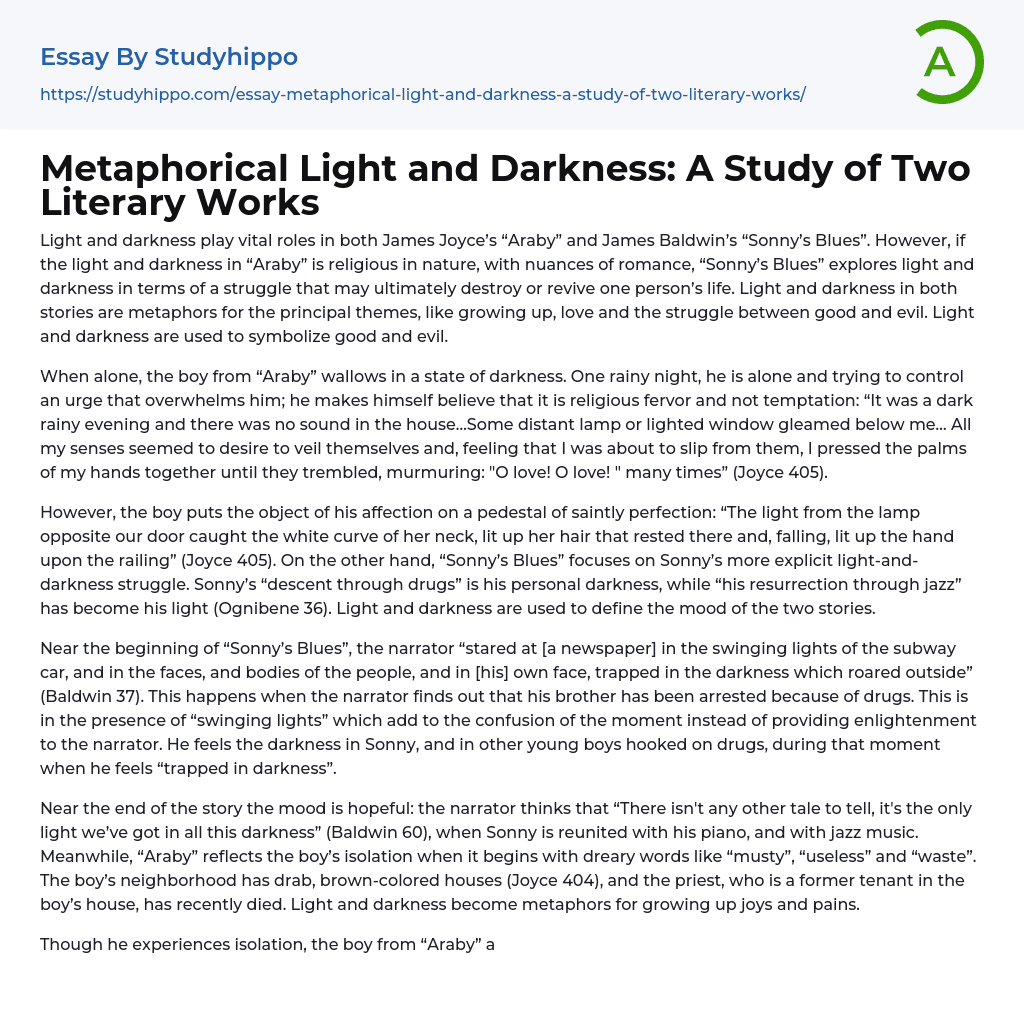

Metaphorical Light and Darkness: A Study of Two Literary Works Essay Example
The significance of light and darkness in James Joyce's "Araby" and James Baldwin's "Sonny's Blues" varies in their underlying meaning. In "Araby", light and darkness are imbued with religious connotations intertwined with romance, whereas in "Sonny's Blues", they symbolize a personal struggle that can either devastate or rejuvenate one's life. Therefore, these contrasting depictions of light and darkness function as metaphors for significant themes such as development, affection, and the conflict between good and evil present in both narratives.
The boy from "Araby" experiences a sense of darkness when he is alone. On one rainy night, he finds himself alone and struggling to resist a strong urge. He convinces himself that this urge is not temptation but rather religious fervor. He describes the scene around him:
..."It was a dark rainy evening and there was no sound in the house... Some distant lamp or lighted window gleamed below me..." In an attempt to control his desires, he presses his hands together until they tremble, repeating the words "O love! O love!" (Joyce 405).
< p style="text-align: justify"> Both stories use the concept of light and darkness to shape the atmosphere. In the first story, the boy admires his love interest and describes her beauty using vivid imagery: "The light from the lamp opposite our door caught the white curve of her neck, lit up her hair that rested there and, falling, lit up the hand upon the railing" (Joyce 405). On the other hand, "Sonny's Blues" directly explores Sonny's struggle between darkness and light. His battle with drugs represents his personal darkness, while his redemption through jazz symbolizes his journey towards enlightenment (Ognibene
36). Ultimately, it is through their use of light and darkness that both narratives create their mood.
While riding the subway and looking at a newspaper, the narrator of "Sonny's Blues" notices the faces and bodies of people on the train. Along with them, he sees his own reflection in the swinging lights that illuminate the subway car. However, he also feels a sense of confinement in the darkness that lies beyond what is illuminated. This feeling intensifies when he learns about his brother's arrest on drug-related charges. The presence of the swinging lights adds to his confusion during this moment, offering no clarity or understanding. It is in this moment that he not only acknowledges Sonny's darkness but also recognizes it in other young boys who are entangled in drugs.
At the conclusion of the story, there is a glimmer of hope as the narrator reflects on how Sonny's piano and jazz music bring light amidst all the darkness (Baldwin 60). Meanwhile, in "Araby," loneliness envelops the boy through words like "musty," "useless," and "waste." The boy's neighborhood consists of dull, brown houses (Joyce 404), and the recent passing of the priest adds to his desolation. Light and darkness symbolize both joy and pain in the journey towards adulthood.
Despite feeling isolated, the boy in "Araby" discovers his first taste of love. Though surrounded by a bleak environment, he sees Mangan's sister as a beacon of hope for his dreams and idealism. This darkness symbolizes the boy's confusion and disappointments during his coming of age. Similarly, Sonny's upbringing in Harlem proves challenging, but instead of finding light in a person, he
finds it through his love for music. In his search for identity, Harlem presents numerous obstacles, including the darkness of drug addiction.
Returning to his passion for playing the piano helps bring him back to sobriety and into a positive state. Sonny has matured and gained wisdom from his own life experiences. "Araby" and "Sonny's Blues" both delve into similar themes, utilizing light and darkness as symbolic elements. Sonny and the boy from "Araby" both undergo periods of darkness while growing up and face the ongoing battle between good and evil, particularly as they are still trying to establish their own identities. The boy in "Araby" is left disappointed by life, whereas Sonny is determined not to disappoint himself or others.
- Book Summary essays
- Metaphor essays
- Reader essays
- Rhyme essays
- Literary devices essays
- Villain essays
- Books essays
- Genre essays
- Literary Criticism essays
- Writer essays
- Protagonist essays
- Simile essays
- Poem essays
- Book Report essays
- Book Review essays
- Greek Mythology essays
- Plot essays
- Tragic Hero essays
- Coming of Age essays
- Play essays
- Rhetoric essays
- Rhetorical Question essays
- Translation essays
- Understanding essays
- Reason essays
- Character essays
- Letter essays
- American Literature essays
- Literature Review essays
- Utopia essays
- Poetry Analysis essays
- Dante's Inferno essays
- Between The World and Me essays
- Incidents in The Life of a Slave Girl essays
- Flowers for Algernon essays
- Myth essays
- Everyday Use essays
- Boo Radley essays
- Genesis essays
- Richard iii essays
- Alice in Wonderland essays
- On the road essays
- Ozymandias essays
- The Nightingale essays
- Holden Caulfield essays
- Animal Farm essays
- 1984 essays
- A Hanging essays
- Shooting An Elephant essays
- A Tale Of Two Cities essays



